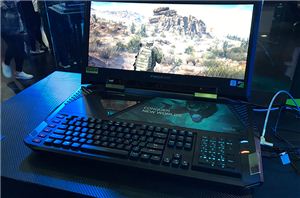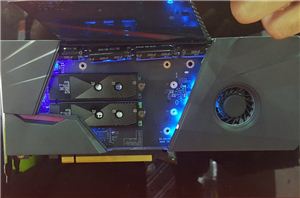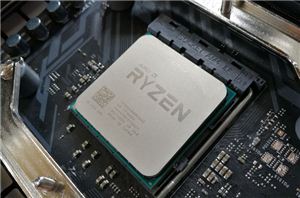AMD Confirms PCIe 4.0 Not Coming to Older Motherboards (X470, X370, B350, A320)
by Ian Cutress on June 2, 2019 11:15 PM EST
One of the salient points of the next generation Ryzen 3000 CPUs coming next month was the support around PCIe 4.0. As the successor to PCIe 3.0, offering double the bandwidth and a range of other optimizations, the combination of the new technology paired with existing and new AM4 motherboards was always going to generate a bit of an issue with support. AMD, through a Reddit post, and confirmed by our sources at AMD’s partners, has clarified the issue.
Moving from PCIe 3.0 to PCIe 4.0 on a motherboard isn’t overly difficult. In order to qualify for PCIe 4.0 use, the signaling guidelines for the connecting traces between the CPU and PCIe slots have to be met. If the PCIe 3.0 motherboard was over-engineered in the first place, and supports PCIe 3.0 very well, there is every chance that those same connecting traces can carry a PCIe 4.0 signal without any issue. The problem becomes when some motherboards can succeed in PCIe 4.0, whereas others cannot because they can only barely support PCIe 3.0.
Before the launch of Ryzen 3000, many users (ourselves included) had speculated about PCIe 4.0 support on older motherboards, such as X470, X370, and the cheaper chipset variations. For those users who had bought into this market with a nice expensive motherboard, it was expected that these models were designed rigorously enough to also support PCIe 4.0. We have even seen some GIGABYTE motherboards already provide the option in the BIOS to support PCIe 4.0. However, AMD has nixed that idea, and those BIOS options will be reversed.
The only motherboards that will support PCIe 4.0 in the future will be the 500-series chipset, which is currently only the X570 range, although the B550 line-up is expected to come later this year. These chipsets are qualified for PCIe 4.0, but older chipsets will not be. AMD doesn’t want to create confusion in the market based on motherboard quality, where some users might be able to have it and others might not.
The exact quote comes from Robert Hallock, one of the Ryzen product managers at AMD, in a post on Reddit:
"Pre-X570 boards will not support PCIe Gen 4. There's no guarantee that older motherboards can reliably run the more stringent signaling requirements of Gen4, and we simply cannot have a mix of "yes, no, maybe" in the market for all the older motherboards. The potential for confusion is too high. When final BIOSes are released for 3rd Gen Ryzen (AGESA 1000+), Gen4 will not be an option anymore. We wish we could've enabled this backwards, but the risk is too great."
This means that in this instance, the recommendation becomes that if a user wants full access to PCIe 4.0, they will have to purchase an X570 motherboard. All Ryzen 3000 CPUs are likely to still run in X470 and X370 motherboards with a BIOS update, but because PCIe is backwards compatible, these CPUs will run in PCIe 3.0 mode.
To be honest, there are two ways to take this news. Sure, it’s a kick in the craw for anyone who invested in a high-end X370 or X470 motherboard. However the flip side of this is that there are not going to be many PCIe 4.0 devices on the market through 2019. We will see AMD’s Navi GPUs which are expected to replace the Polaris mid-range product stack, so if you already have a high-end GPU, it’s not going to bother you too much. For the PCIe 4.0 SSDs, we expect a couple of them to launch but these are the Phison E16 designs which run at 8W TDP and will likely command a high premium with an 8W TDP too – it might be best to wait until 2020 when dedicated PCIe 4.0 controllers come to the market.
I’ll be honest, it does make our job a bit easier. I contemplated having a news post where we kept track of all the 300-series and 400-series motherboards that support PCIe 4.0, but that suddenly got a lot simpler: if you want PCIe 4.0 on AMD in 2019, get a 500-series motherboard.
| Want to keep up to date with all of our Computex 2019 Coverage? | ||||||
 Laptops |
 Hardware |
 Chips |
||||
| Follow AnandTech's breaking news here! | ||||||
Source: Reddit











50 Comments
View All Comments
cowboy44mag - Monday, June 3, 2019 - link
Depends on the graphics card that is utilized. I have seen the RTX 2080 Titan fully saturate PCIe 3.0 and I believe that the RTX 2080Ti can as well. Its not easy to get them to do so and most normal applications or gaming isn't going to push those monster cards that hard, but it is possible. The biggest problem with PCIe 4.0 in respects to current graphics cards is simply that the highest end graphics cards available don't support PCIe 4.0, making the technology moot until the next gen of graphics cards launch that will have PCIe 4.0 native support.sing_electric - Monday, June 3, 2019 - link
Given that all of the previous X-series chipsets have only appeared on ATX (or larger) boards, it means that potential Ryzen 3000 series customers who wanted to build a smaller system (mATX or ITX, etc.) are now forced to decide between waiting to build until the B-series is released, or buying an older board and forgoing PCIe 4.0 support. If you planned on holding on to the system for a while, that could be an issue, particularly for SSDs (there's a surprising number of mATX boards that have 2 m2 slots, making a new, faster SSD an easy drop-in upgrade).JMC2000 - Monday, June 3, 2019 - link
"Given that all of the previous X-series chipsets have only appeared on ATX (or larger) boards..."The ROG STRIX X370-I/X470-I, ASRock X370/X470 Gaming ITX/AC would like to have words with you; not to mention the upcoming ASUS and ASRock MiniITX/MiniDTX boards.
cowboy44mag - Monday, June 3, 2019 - link
https://www.asus.com/Motherboards/ROG-Crosshair-VI...That a lot of power in a small package!!
WaltC - Monday, June 3, 2019 - link
Makes sense, and no one who bought an x370/x470 motherboard expected to get PCIe4.x support from it. People don't also realize that PCIe4.x lanes from the x370/x470 chipset would require the x570 chipset anyway. At best you might have seen some problematic support for pcie4.x from the cpu in an x370/x470--maybe. Better to confine it to x570 chipset--drawing ~11W I hear, versus the x470 which draws ~5W.sknaumov - Monday, June 3, 2019 - link
Does someone know whether improved memory support depends only on processor or motherboard is also significantly involved from hardware point of view? Will it be enough to update BIOS on older motherboards to enjoy compatibility with higher clocked DDR4?cowboy44mag - Monday, June 3, 2019 - link
The processor has a role to play but from my experience the motherboard plays a much larger role in memory support, and that is at a hardware level. X570 will doubtless have better memory support than X470, which has better support than X370. While bios updates can help, the only way to truly support higher overclocks on the memory is with hardware improvements. In short bios updates are software and we have already seen that X370 can't support the same memory speeds as X470, so logically X470 won't be able to have as high memory clocks as X570 no matter what bios updates come out.X570 is supposed to support 3200Mhz right out of the box and is supposed to be able to support up to 5000Mhz, which is insane. With my X470-F Strix I am running 3200Mhz GSkill (Samsung B die) @ 3600Mhz CL14 with very tight sub timings. While it is possible that I might be able to squeeze a little more out of it with a X570 board the memory itself is already pushing its upper limits so realistically I won't see anymore RAM performance on X570 than I am already getting on X470 without buying 3600, 4000Mhz RAM+ which is almost as expensive as buying a new motherboard.
Until RAM prices drop for 4000+Mhz RAM the improved memory support of the X570 motherboards is again nice to have, but cost preventative. These new boards will have a lot of nice "future proof" qualities, but at the same time by the time that M.2 SSDs that can support PCIe 4.0 drop in price and 4000+ Mhz RAM drops in price the next gen X670 boards will be soon to release bringing some other new feature.
I'd say if you already have a quality X470 board that there really isn't a reason to upgrade to X570 unless you have tons of money to throw at the very latest and fastest M.2 SSDs and RAM.
Threska - Wednesday, June 5, 2019 - link
Is speed the sole benefit that PCIe 4.0 brings?https://www.viavisolutions.com/en-us/what-pcie-40
Westmassguy - Tuesday, June 4, 2019 - link
Re-read the 3rd paragraph. AMD never said older motherboards would be upgraded via a BIOS update. It was speculated, then magically became fact? It was expected because of all the speculation.Bensam123 - Wednesday, June 5, 2019 - link
Silly. Part of the PC consumer space is finding that rare gem that does something others don't and then getting to brag about it. I don't think there are going to be many people hunting down older x470 boards for new builds to get PCIE 4.0. But people on older boards will be happy with added support. Bad move AMD, I'm sure the modding community will take care of it.